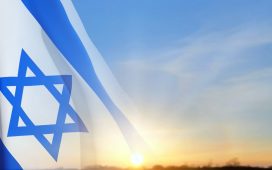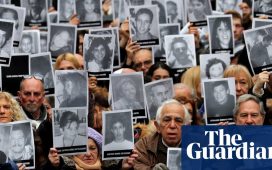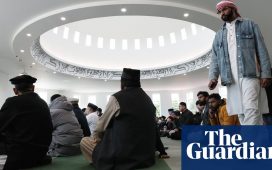When Mona El Baba was in high school, a teacher told her she was “too stupid” to take a legal studies class and was destined to be “another Muslim housewife”.
“He said, ‘if my mum were to see you she would spit on your hijab’,” El Baba says. “I have never forgotten that”.
According to a new survey by the Australian Human Rights Commission, 80% of Muslim people living in Australia have experienced some form of unfavourable treatment based on their religion, race or ethnicity.
Half of all respondents had received unfavourable treatment from law enforcement, or when seeking employment. Some 29%, like El Baba, were discriminated against in a school setting. And yet despite that harassment, 74% of the 1,017 respondents said they felt Australian, and 63% said they found Australia welcoming.
El Baba is now 32-years-old and the principal solicitor and founder of El Baba lawyers in western Sydney.
She has experienced harassment on the basis of her religion for 20 years, since she donned the hijab at the age of 12. She also represents others who have lost work or been harassed by police due to their faith.
“I find sometimes that if I have the hijab on, but I am in a different part of the city, I experience discrimination to this day,” she says.
The survey was commissioned in the wake of the 2019 Christchurch mosque attacks, in which an Australian man shot dead 51 worshipers. Seventy-nine per cent of respondents said the terror attack made them feel afraid to be in Australia, while 60% said they were not surprised that a mosque had been targeted.
One man who responded to the survey said, “we are afraid while standing for Friday prayers that it could be our last prayer”.
A young woman told the survey she “felt like a target with my hijab”.
“I didn’t want my family to go out. I just didn’t know how to keep anyone safe but at the same time felt too scared to not do anything.”
Rita Jabri-Markwell, a spokesperson for the Australian Muslim Advocacy Movement, says she hopes the survey will encourage people to talk about the trauma of the Christchurch attacks.
“We don’t talk about it fully,” she says. “A lot of men in our community are very stoic about it … I think it will spur a lot of conversations around the Eid table about how it has affected us.
“The fact that it was an Australian terrorist, he was born and raised here, and since the attack the Australian government has not really accepted that Islamophobia is a problem”.
There is a reluctance to acknowledge the role that Islamophobia in Australia had in the Christchurch attacks, says Jabri-Markwell.
“I think on some deep level people do hold the idea that it’s OK to discriminate against Muslims because of terrorism,” she says. “And that is inherently racist. You can’t attribute responsibility to a whole group of people based on the actions of a few.”
New South Wales has no civil law protections for discrimination on the basis of religion. Only Victoria, Queensland, Tasmania and the Australian Capital Territory have civil protections for both religious discrimination and religious vilification.
Sydney lawyer Zaahir Edries is in-house counsel for GetUp. He says the lack of uniform legal protections for Muslims facing discrimination is representative of the political culture in Australia, which has used Muslims as a political football in anti-terror laws and immigration laws since 2001.
Edries was studying engineering at university in Perth at the time. After the September 11 attacks, he says, peers and teachers began treating him differently. “Even though I sound like I do, and play all the sports, and I do all the things that a good immigrant should do … it was not good,” he says.
Edries was born in South Africa but has a broad Australian accent. Before 9/11, he was singled out for his skin colour, or for being a migrant, but never for his religion.
Afterwards, he became both scapegoat and spokesperson, expected to explain and apologise for the activities of a small group of people on the other side of the world. “Your relationship with the world adjusts immediately,” he says. “I was not looking to hide my Islamic identity … but the questions you would get asked – anyone could come up to you and the curiosity that may have been there before was replaced with a sense of entitlement.
“I needed to reassure people about something that happened on the other side of the world, that had nothing to do with me, with my culture, with my upbringing. Now suddenly you had to be an expert in everything that’s going on in the world; an expert in geopolitics, in my faith. No one else is asked all these complex questions about their faith other than Muslims.”
The experience prompted him to switch to law school.
Like Edries, Jabri-Markwell was studying at university in 2001. She does not wear hijab, and says many of her classmates appeared not to realise she was Muslim.
“I was hearing the racism but not saying anything. Which was killing me from the inside, it was like drinking poison.
“I was hearing people in my class joking that we should just nuke the whole Middle East, destroy Arabs like bugs. And I was sitting there thinking, do I say anything or do I survive?”
Edries was lucky, he says, to have been in his late teens in 2001, old enough to see the way the political rhetoric around Muslims changed, and to see the Islamophobia sweep in. Younger people have never known different.
“We have young adults now who were born politicised,” he says.
Race discrimination commissioner Chin Tan says the report shows the need for urgent national attention to support Muslim communities and “improve social cohesion”.
“It’s not enough to simply condemn racism,” he says. “We need a coordinated strategy that works on many fronts to actively counter racism at the various levels that it occurs.”






